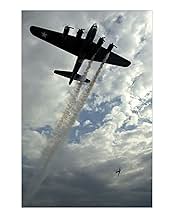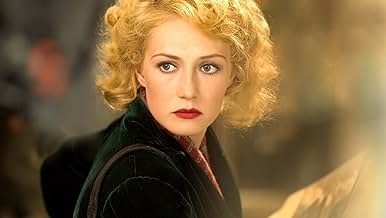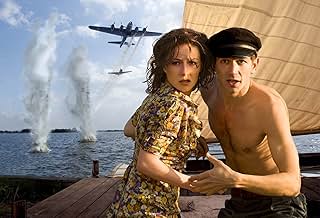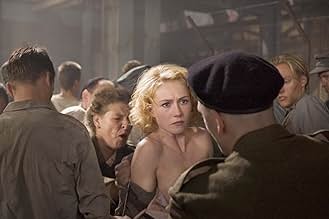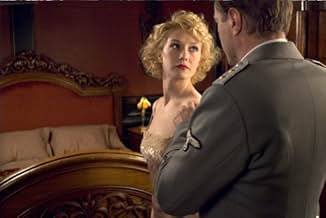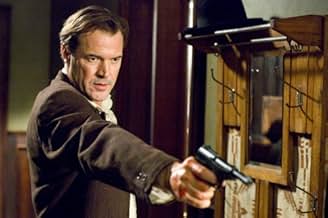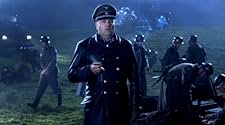ÉVALUATION IMDb
7,7/10
82 k
MA NOTE
Aux Pays-Bas occupés par les nazis pendant la Seconde Guerre mondiale, un chanteur juif infiltre le siège régional de la Gestapo pour la résistance néerlandaise.Aux Pays-Bas occupés par les nazis pendant la Seconde Guerre mondiale, un chanteur juif infiltre le siège régional de la Gestapo pour la résistance néerlandaise.Aux Pays-Bas occupés par les nazis pendant la Seconde Guerre mondiale, un chanteur juif infiltre le siège régional de la Gestapo pour la résistance néerlandaise.
- Nominé pour le prix 1 BAFTA Award
- 13 victoires et 23 nominations au total
Histoire
Le saviez-vous
- AnecdotesMost actors speak more than one language in the film. Carice van Houten speaks four languages fluently in the course of the film: Hebrew in the scenes in Israel, German with Nazi soldiers, English with Canadian army personnel and Dutch for the majority of the film.
- GaffesInsulin, even injected directly into the blood stream, would not act as fast as shown to lower blood sugar.
- Citations
Rachel Stein aka Ellis de Vries: I never knew this would happen. To fear the liberation...
- ConnexionsEdited into Zwartboek: The Special (2006)
- Bandes originalesIch bin die fesche Lola
Music by Friedrich Hollaender (as Friedrich Hollaender)
Lyrics by Robert Liebmann
Performed by Carice van Houten
(c) 1930 by Ufaton-verlagsgesellschaft mbH (BMG Music Publishing Germany), Munich
Commentaire en vedette
Director Paul Verhoeven's self-confessed aim is to combine art and business, appeal to a broad audience, and yet still have some endurance. The fame of films like Basic Instinct and Total Recall is lasting, yet they court criticism with their use of sexuality or by playing to the (easily dismissible) sci-fi genre. Graphic sex and violence are common in his movies and, when you add the occasional major flop such as Showgirls, the work of Verhoeven often fails to be taken seriously. Yet Black Book deserves respect. It is a wartime resistance movie on an epic scale, freed of the conventions of British and American war movies, yet bringing their typically high production values to a uniquely Dutch film.
Israel 1956. A Holy Land Tours bus stops off at a Kibbutz. One of the passengers recognises a teacher there, Rachel, from times they had shared during the war. As her friend leaves, Rachel thinks back to Holland in 1944. She was an accomplished cabaret singer but also Jewish. She was in hiding, waiting for the war to end. But chance misfortune means she has to try to make a getaway with some other Jewish people. They are ambushed, and she is almost shot. A little later she starts working for the resistance ('terrorists' as the Nazis call them) and infiltrates the Gestapo, seducing a high ranking officer called Muntze.
What follows is a frantic game of cat and mouse, espionage and counter-espionage. Rachel (now called Ellis) is torn between the horrors inflicted on her friends close-by and the elaborate deceits she tries to play to save them. Gradually it becomes clear that Muntze, anticipating the end of the war, is risking his neck to try to minimize death and suffering on both sides, and one or more of the resistance fighters is selling out to the Nazis to reap rich profits. Muntze, like Rachel, has had to overcome great losses. Their humanity is a bridge that brings them closer.
Rachel/Ellis is played by Carice van Houten, a leading actress of the Dutch screen. Her presence is luminous and charismatic (for British/American audiences, there is the curious sensation of watching someone unknown who radiates star quality with every breath). Her character has to adapt to many contrasting situations yet there is an underlying determination and fast thinking that shines through and makes such changes seem in character and unscripted. We share her emotional struggle and watch her pit her wits against the Gestapo (who are not exactly stupid). The movie is worth seeing for her performance alone.
On the one hand, the film has been minutely researched, based on actual events and characters; on the other it still has the slightly larger than life gloss we might associate, say, with a James Bond film. The escapes are in the nick of time, the sex scenes are steamy, and the plot twists increase exponentially as we get closer to the end.
Not content to portray the unique conditions of Holland during the occupation, Black Book goes on to catalogue post war atrocities and Rachel's eventual journey to Israel. The style and delivery will not appeal to everyone, but Black Book is Verhoeven on top form, delivering grand entertainment that shows his talents (and those of the remarkable Carice van Houten) at their finest.
Israel 1956. A Holy Land Tours bus stops off at a Kibbutz. One of the passengers recognises a teacher there, Rachel, from times they had shared during the war. As her friend leaves, Rachel thinks back to Holland in 1944. She was an accomplished cabaret singer but also Jewish. She was in hiding, waiting for the war to end. But chance misfortune means she has to try to make a getaway with some other Jewish people. They are ambushed, and she is almost shot. A little later she starts working for the resistance ('terrorists' as the Nazis call them) and infiltrates the Gestapo, seducing a high ranking officer called Muntze.
What follows is a frantic game of cat and mouse, espionage and counter-espionage. Rachel (now called Ellis) is torn between the horrors inflicted on her friends close-by and the elaborate deceits she tries to play to save them. Gradually it becomes clear that Muntze, anticipating the end of the war, is risking his neck to try to minimize death and suffering on both sides, and one or more of the resistance fighters is selling out to the Nazis to reap rich profits. Muntze, like Rachel, has had to overcome great losses. Their humanity is a bridge that brings them closer.
Rachel/Ellis is played by Carice van Houten, a leading actress of the Dutch screen. Her presence is luminous and charismatic (for British/American audiences, there is the curious sensation of watching someone unknown who radiates star quality with every breath). Her character has to adapt to many contrasting situations yet there is an underlying determination and fast thinking that shines through and makes such changes seem in character and unscripted. We share her emotional struggle and watch her pit her wits against the Gestapo (who are not exactly stupid). The movie is worth seeing for her performance alone.
On the one hand, the film has been minutely researched, based on actual events and characters; on the other it still has the slightly larger than life gloss we might associate, say, with a James Bond film. The escapes are in the nick of time, the sex scenes are steamy, and the plot twists increase exponentially as we get closer to the end.
Not content to portray the unique conditions of Holland during the occupation, Black Book goes on to catalogue post war atrocities and Rachel's eventual journey to Israel. The style and delivery will not appeal to everyone, but Black Book is Verhoeven on top form, delivering grand entertainment that shows his talents (and those of the remarkable Carice van Houten) at their finest.
- Chris_Docker
- 29 janv. 2007
- Lien permanent
Meilleurs choix
Connectez-vous pour évaluer et surveiller les recommandations personnalisées
Détails
- Date de sortie
- Pays d’origine
- Sites officiels
- Langues
- Aussi connu sous le nom de
- Black Book
- Lieux de tournage
- sociétés de production
- Consultez plus de crédits d'entreprise sur IMDbPro
Box-office
- Budget
- 21 000 000 $ US (estimation)
- Brut – États-Unis et Canada
- 4 398 532 $ US
- Fin de semaine d'ouverture – États-Unis et Canada
- 112 521 $ US
- 8 avr. 2007
- Brut – à l'échelle mondiale
- 26 768 563 $ US
- Durée2 heures 25 minutes
- Couleur
- Mixage
- Rapport de forme
- 2.35 : 1
Contribuer à cette page
Suggérer une modification ou ajouter du contenu manquant



